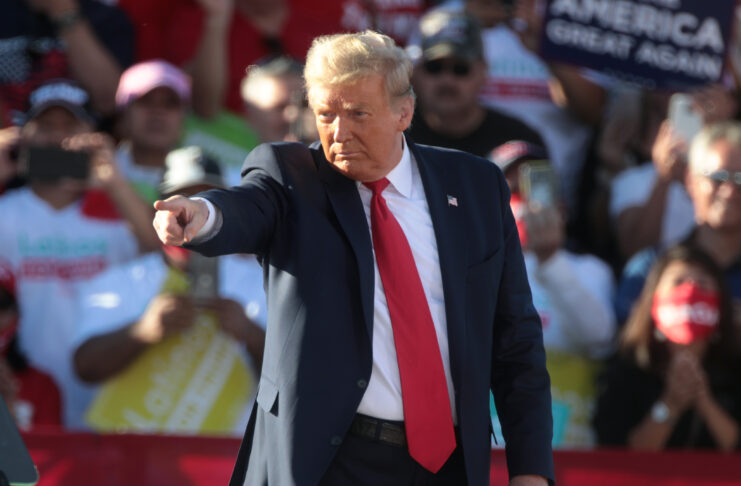One of the attorneys defending former President Donald Trump has a well-earned reputation in the legal world and the hip-hop community. Some of the biggest names in rap refer to Drew Findling as the “magician” because of his ability to get high-profile defendants like Cardi B off the hook. Other celebrity clients include Gucci Mane, DaBaby, Waka Flocka Flame and NBA hall of famers Shaquille O'Neal and Dennis Rodman.
Never shy to share his opinions, Findling has publicly condemned Trump for years, calling him “pathetic” and “racist” for disparaging Black Lives Matter protesters and insulting LeBron James' intelligence. After the Supreme Court overturned Roe v. Wade, Findling vowed on social media to commit his elite Atlanta law firm to “fighting to restore a woman's right to choose.”
But none of that means he's unwilling to provide Trump with the most aggressive defense possible. Controversy arose Monday when an incomplete document listing Trump's charges was released hours before the grand jury decided to indict. Led by Findling, Trump's legal team seized on the apparent mistake, arguing Fulton County District Attorney Fani Willis had rushed the indictment process. The document was soon deleted from the Fulton County Court website after Reuters published it. (RELATED: Trump Indicted In Georgia Election Probe)
Findling and co-counsels Jennifer Little and Marissa Goldberg called its brief publication a “leak of a presumed and premature indictment before the witnesses had testified or the grand jurors had deliberated.” Other legal experts called it an embarrassing clerical error.
“We look forward to a detailed review of this indictment which is undoubtedly just as flawed and unconstitutional as this entire process has been,” they added. “In light of this major fumble, the Fulton County District Attorney's Office clearly decided to force through and rush this 98-page indictment.”
Following the document's publication, DA Willis informed Reuters that the grand jury had not yet decided on charges against Trump.
As of yet, there is no evidence of malicious intent or failure to follow the indictment process based on the two-page document's release.
A statement from the Office of the Fulton County Clerk of Superior and Magistrate Courts noted that “documents that do not bear an official case number, filing date, and the name of The Clerk of Courts, in concert, are not considered official filings and should not be treated as such.”
As for Findling, Vice News' Greg Walters sought out why the #BillionDollarLawyer decided to represent Trump in a February article and what made him the right man for the job. (RELATED: Hunter Biden's Lead Attorney Asks To Withdraw From Case)
For starters, Findling insists his personal views are irrelevant:
“Ethically, we as criminal defense attorneys have an obligation to represent anybody and everybody,” Findling said. “I don't say, ‘Oh, you know, you're a rap star? I don't represent you. You played in the NBA? I don't represent you. You're a Republican? I don't represent you. You're the former president? I don't represent you.' I don't do that.”
He explained that not being afraid of controversy is a necessary job requirement for any criminal defense attorney worth their salt.
“I've been dealing with controversy for 35 years, man,” Findling began. “The first case that I tried, that I was lead counsel on, was a woman that decapitated her six-year-old son. I've been dealing with controversy since I was 25 years old. It's not going to stop now. It's what we do as criminal defense attorneys. Either love it, or you do real estate closings.”
Regarding his tweets about Trump, Findling said he couldn't care less if his client's seen them, which he's sure he has.
Short of breaking the law or his moral compass, Findling adds that he always does everything “legally, ethically, professionally and morally” to defend his clients.
He largely refrained from commenting on Willis' ongoing investigation. Still, he drew a comparison between his defense of rappers with potentially incriminating lyrics and Trump's call with Georgia Secretary of State Brad Raffensperger:
Prosecutors have increasingly leaned into the controversial practice of using rappers' lyrics against them to support criminal charges—as Willis recently did against Young Thug.
In August, Willis told a press conference: “I think if you decide to admit your crimes over a beat, I'm going use it.” She added: “I have some legal advice. Don't confess to crimes on rap lyrics if you do not want them used, or at least get out of my county.”
But Findling argued context is crucial—both for rappers ensnared in gang prosecutions, and for a former president having a dispute with a local elections official.
“Prosecutors, first of all, don't know the first thing about lyrics,” he said. “They'll take out eight or nine words. They'll take out something that lasts a few seconds and say, ‘Aha, this is evidence of some wrongdoing.' In like fashion, no one ever talks about the full 62 minutes. No one ever talks about the surrounding circumstances of those 62 minutes.”
A Georgia grand jury has since indicted Trump on 13 counts, including a violation of the state's anti-racketeering law (RICO), which Willis has used to prosecute defendants before.
Calling the allegations against Trump and his inner circle “very serious,” the hard-charging district attorney told The Washington Post in January, “If indicted and convicted, people are facing prison sentences.”
READ NEXT: FBI Kills Elderly Utah Man Who Threatened Biden Online



Proof!…thats the only thing that works in a court of law.
Lets see actions in Court OK
Sure, likes and dislikes make the world go round, however a lawyer needs but a brain and good strategy and likes and dislikes should not matter.